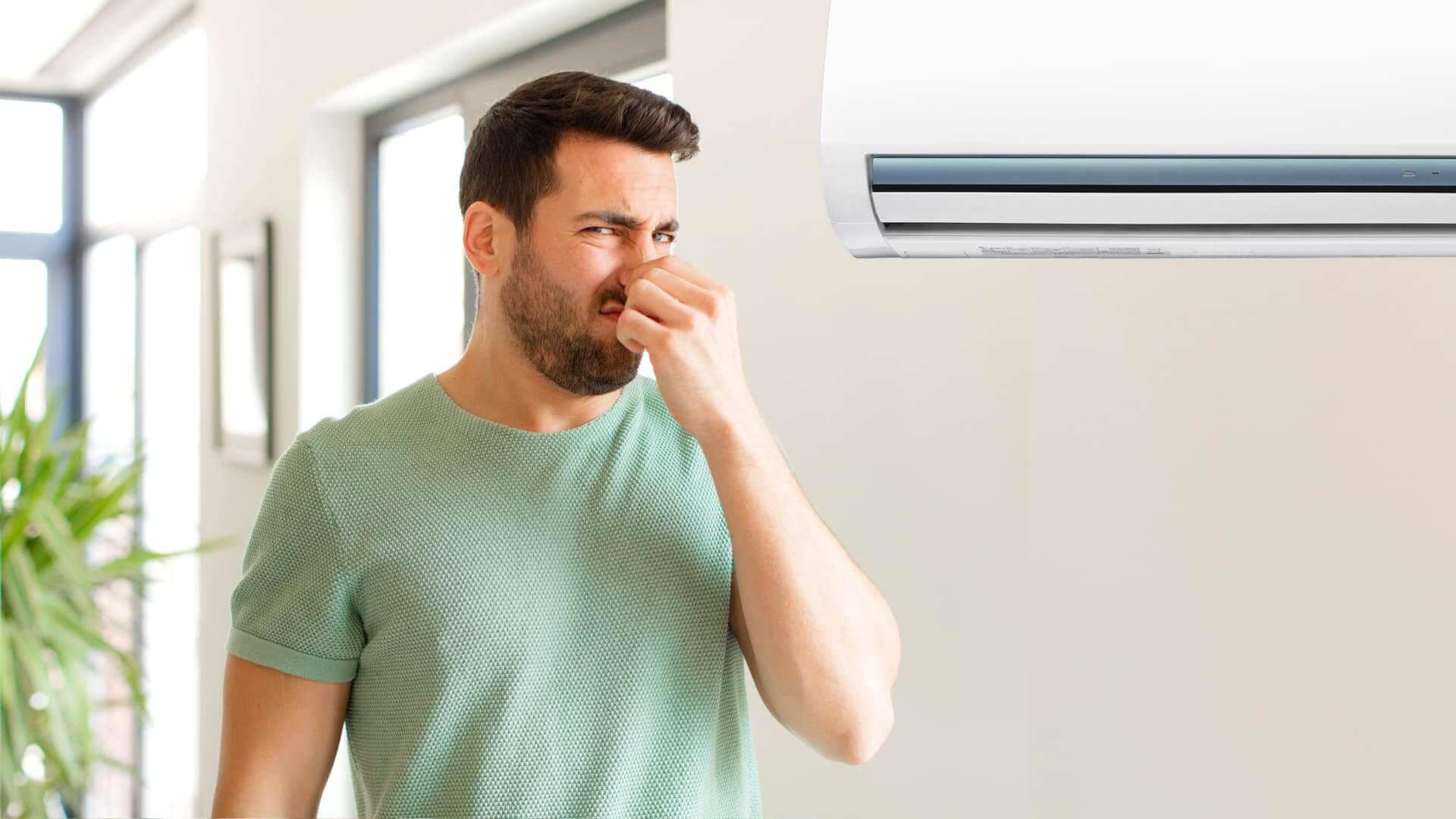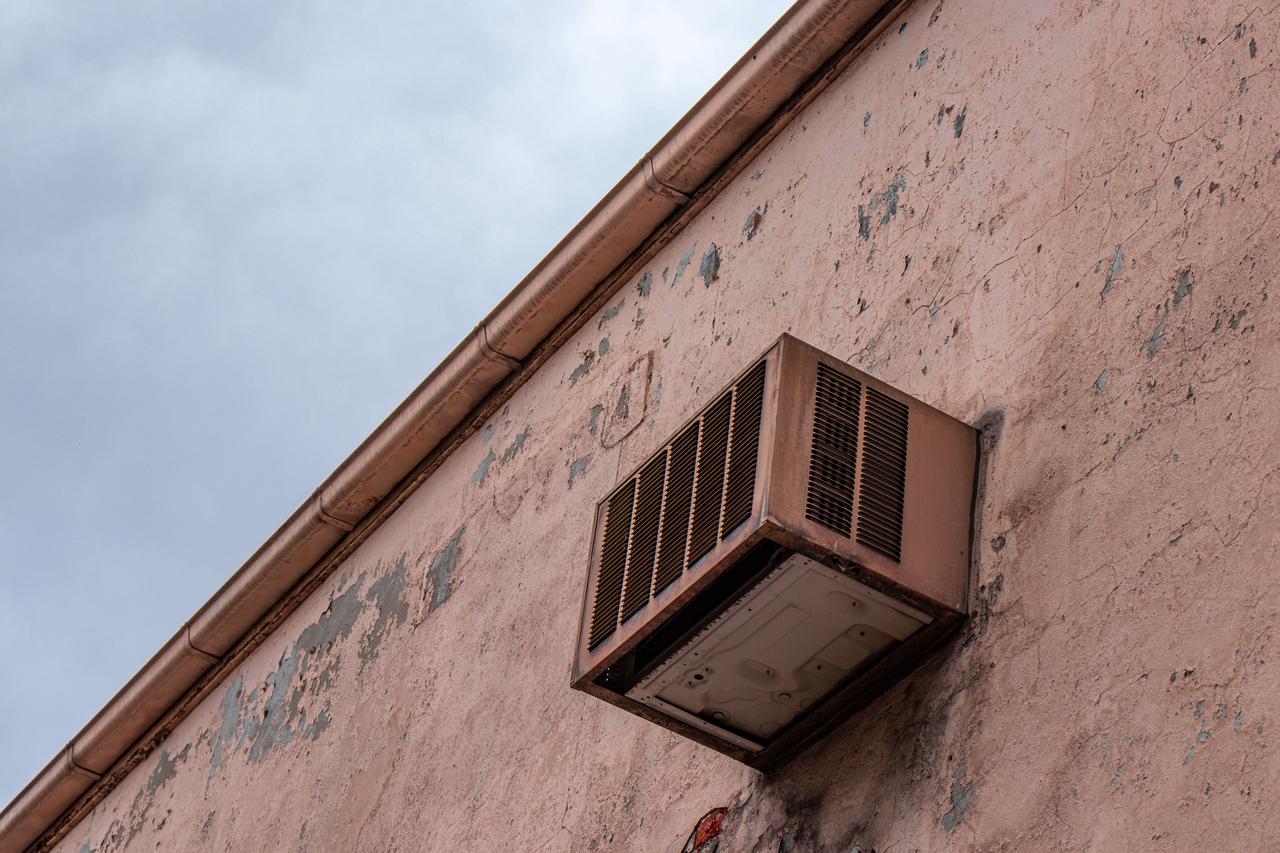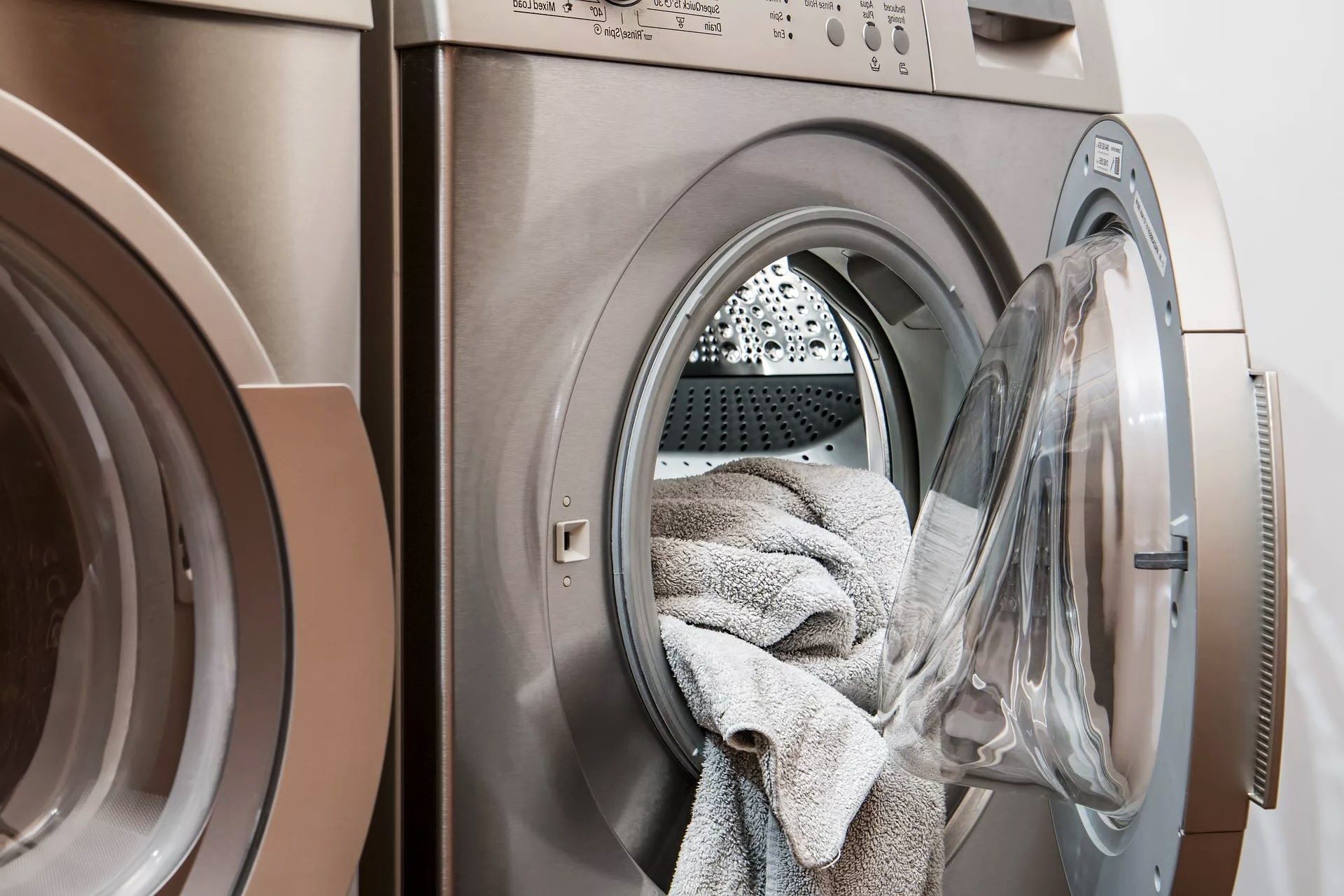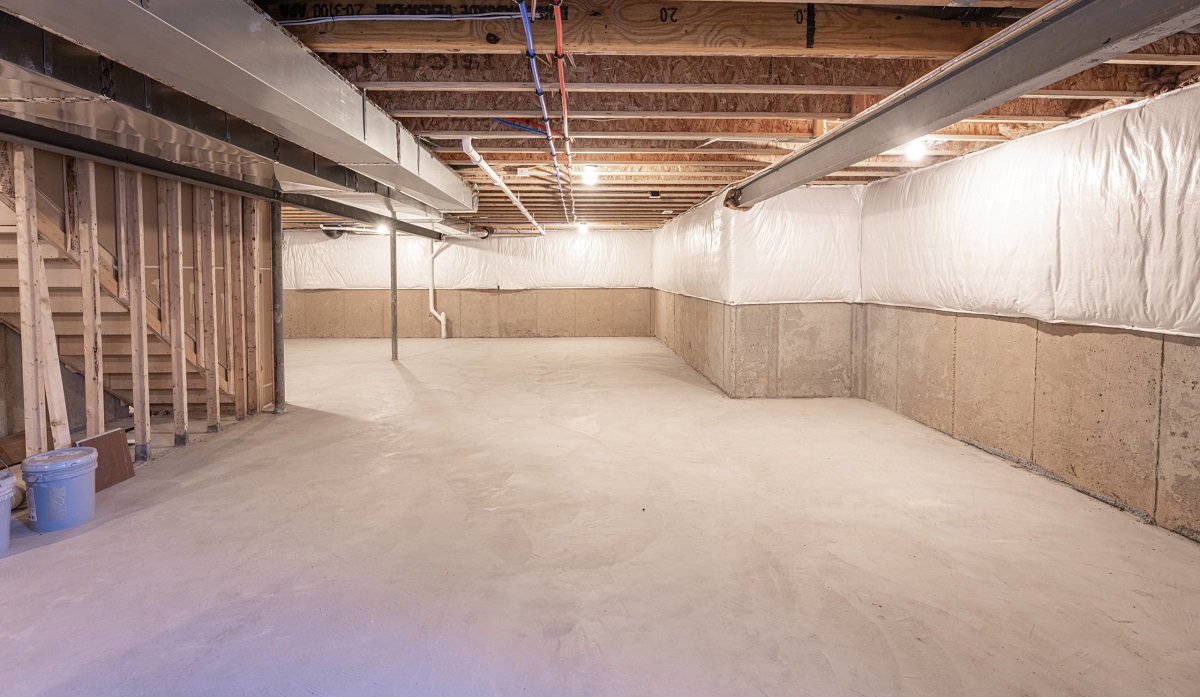

Articles
Why Does My AC Smell Like Vinegar
Modified: April 23, 2024
Discover articles explaining why your AC smells like vinegar and learn how to fix the issue. Find expert advice and tips to improve your air quality.
(Many of the links in this article redirect to a specific reviewed product. Your purchase of these products through affiliate links helps to generate commission for Storables.com, at no extra cost. Learn more)
Introduction
Have you noticed a peculiar vinegar-like smell coming from your air conditioning system? If so, you’re not alone. Many homeowners have experienced this unpleasant odor and are left wondering why their AC smells like vinegar. The truth is, there are several possible causes for this issue, and understanding them can help you diagnose and resolve the problem.
When your AC emits a vinegar-like odor, it is often a sign that there is a problem within the system. Ignoring this smell can lead to further issues and compromise the performance of your air conditioner. It’s important to address the problem promptly to ensure a clean and comfortable indoor environment.
In this article, we will explore the possible causes of a vinegar smell in your AC system and provide practical solutions to eliminate the odor. By understanding the root causes and implementing the necessary steps, you can restore the freshness and efficiency of your air conditioning unit.
Key Takeaways:
- Regularly cleaning or replacing air filters is essential to eliminate the vinegar smell in your AC system, improve indoor air quality, and enhance overall performance and efficiency.
- Taking preventive measures, such as maintaining proper humidity levels, scheduling annual maintenance checks, and promptly addressing water leaks, can prevent the reoccurrence of the vinegar smell and ensure a comfortable living environment.
Read more: Why Does My AC Smell Like Pee
Possible Causes of Vinegar Odor in AC
When your AC emits a vinegar odor, it can be unpleasant and concerning. Here are some of the possible causes for this lingering smell:
- Dirty Air Filters: One of the most common causes of a vinegar smell in your AC is dirty air filters. Over time, dust, dirt, and debris can accumulate on the filters, creating a breeding ground for bacteria. When the cool air passes through the dirty filters, it can pick up these bacterial particles, resulting in a vinegar-like odor.
- Mold and Mildew Growth: Another common culprit behind the vinegar smell is the growth of mold and mildew within the AC system. Moisture and humidity can create the perfect conditions for mold and mildew to thrive, especially in areas like the evaporator coil or drip pan. The combination of organic matter and moisture can produce a strong vinegar odor.
- Clogged Drain Line: A clogged drain line can also lead to a vinegar smell in your AC. When the drain line gets blocked, water can become stagnant and trapped in the system. This stagnant water can promote the growth of bacteria and mold, resulting in the unpleasant odor.
- Dirty Evaporator Coil: The evaporator coil is responsible for cooling the air that circulates through your AC system. Over time, the coil can accumulate dirt, dust, and even mold. As the air passes through the dirty coil, it can pick up these contaminants and create a vinegar-like smell in your home.
It’s important to note that these are just a few possible causes of a vinegar odor in your AC. Other factors such as a refrigerant leak, electrical issues, or a malfunctioning component can also contribute to the smell. If you are unsure about the cause, it’s best to consult a professional HVAC technician who can assess and diagnose the problem accurately.
Dirty Air Filters
One of the primary causes of a vinegar smell in your AC system is dirty air filters. Air filters are designed to trap dust, dirt, pollen, and other airborne particles before they enter your home. Over time, these filters can become clogged and filled with debris, reducing their effectiveness and causing various issues, including unpleasant odors.
When air filters become dirty, they can create an ideal environment for bacteria and mold to grow. As the air passes through the dirty filters, it can pick up these particles, resulting in a vinegar-like odor being emitted from the vents.
The vinegar smell can be particularly noticeable when you initially turn on your air conditioner after a long period of inactivity, such as during the start of the cooling season. The system has been sitting idle, allowing bacteria and mold to accumulate on the filters, and the odor becomes more prominent when the air starts to circulate again.
To eliminate the vinegar smell caused by dirty air filters, it’s important to clean or replace them regularly. Most manufacturers recommend changing the filters every 30 to 90 days, depending on factors such as the quality of air in your area, the number of occupants in your home, and the presence of pets.
Cleaning or replacing the air filters is a relatively simple task that can be done by following these steps:
- Locate the air filter in your AC system. It is typically located near the air intake or inside the indoor unit.
- Turn off the AC system to avoid any airflow during the cleaning or replacement process.
- If the filters are reusable, remove them from the unit and gently clean them using a vacuum cleaner or by rinsing with water. Allow them to dry completely before reinstalling.
- If the filters are disposable, remove them from the unit and replace them with new ones. Make sure to choose filters that are compatible with your AC system’s specifications.
- Reinstall the cleaned or new filters into the unit, following the manufacturer’s instructions and ensuring they are properly secured.
- Turn on the AC system and allow it to run for a few minutes to ensure proper airflow and ventilation.
Regularly cleaning or replacing your air filters not only helps in eliminating the vinegar smell but also improves the overall air quality in your home and enhances the performance and efficiency of your AC system.
Mold and Mildew Growth
If your air conditioner emits a vinegar-like smell, one possible cause is the growth of mold and mildew within the system. Mold and mildew thrive in dark, damp environments, making your AC system an ideal breeding ground if proper maintenance and cleaning are neglected.
Mold and mildew growth can occur in various parts of the AC system, such as the evaporator coil, drip pan, or air ducts. These areas can accumulate moisture, often due to condensation, high humidity levels, or water leaks. When organic matter, such as dust or dirt, combines with the moisture, mold and mildew spores can develop, resulting in the strong vinegar odor.
If you suspect mold and mildew growth in your AC system, it is crucial to address this issue promptly. Here are some steps you can take to eliminate the vinegar smell caused by mold and mildew:
- Cleaning the Evaporator Coil: The evaporator coil, located inside the indoor unit, is one of the main areas where mold and mildew can grow. Begin by turning off the AC system and removing any debris or visible mold using a soft brush or cloth. You can also use a mixture of mild detergent and water to clean the coil gently. Avoid using harsh chemicals or excessive water, as this can damage the coil.
- Removing Mold from the Drip Pan: The drip pan collects condensation from the evaporator coil. Over time, it can become a breeding ground for mold and mildew. Remove the drip pan and clean it thoroughly with a mixture of water and mild detergent. Rinse it well and ensure it is dry before reinstalling.
- Inspecting and Cleaning the Air Ducts: Mold and mildew can also develop inside the air ducts over time. Hire a professional duct cleaning service to clean and disinfect the ductwork properly. They will use specialized equipment to remove any buildup of mold, dust, or debris, ensuring a clean and fresh airflow throughout your home.
- Maintaining Proper Humidity Levels: High humidity can contribute to the growth of mold and mildew. Consider using a dehumidifier in areas where the AC system is located to control moisture levels and prevent mold growth.
- Regular Maintenance: To prevent mold and mildew growth in the future, regular maintenance of your AC system is essential. Schedule annual maintenance checks with a professional HVAC technician to ensure proper cleaning, inspection, and maintenance of all components.
By addressing mold and mildew growth in your AC system, you can effectively eliminate the vinegar smell and create a healthier and more comfortable indoor environment.
Clogged Drain Line
A clogged drain line can be another culprit behind the vinegar smell in your air conditioning system. The drain line is responsible for removing condensation and excess moisture from the AC unit. Over time, dirt, debris, and other particles can accumulate in the drain line, leading to a blockage.
When the drain line is clogged, water can become trapped within the system, creating a stagnant environment. This stagnant water can then promote the growth of bacteria and mold, resulting in the unpleasant vinegar odor that you may notice.
If you suspect a clogged drain line is the cause of the vinegar smell, here are steps you can take to clear it:
- Turn off the AC system: Before attempting any cleaning or maintenance, ensure that the AC system is turned off to avoid any potential hazards.
- Locate the drain line: The drain line is typically located near the indoor unit and may be attached to a drain pan or directly connected to a drain pipe. Follow the pipe to locate the access point.
- Remove the clog: Use a wet/dry vacuum or a stiff brush to carefully remove any visible debris or blockage from the drain line. Take care not to damage the line or push the clog further into the system.
- Flush the drain line: Once you have removed the initial clog, flush the drain line with a mixture of equal parts vinegar and water. Pour the solution into the line and allow it to sit for a few minutes to break down any remaining debris or buildup. Then, use a gentle stream of water to flush the line and remove the loosened particles.
- Repeat if necessary: If the clog persists, you may need to repeat the process or consider using a drain snake or a professional-grade cleaning solution to clear the line more effectively.
- Professional assistance: If you are uncomfortable or unsure about clearing the clogged drain line yourself, it is advisable to seek help from a professional HVAC technician. They have the knowledge, experience, and specialized equipment to safely and effectively clear the line.
Regular maintenance and cleaning of the drain line can help prevent future clogs and the associated vinegar smell. It is recommended to schedule regular maintenance checks with a professional to ensure the drain line and overall AC system are in optimal working condition.
Dirty Evaporator Coil
The evaporator coil plays a crucial role in the cooling process of your air conditioning system. It absorbs the heat from the surrounding air and cools it down before circulating it back into your home. Over time, the evaporator coil can accumulate dirt, dust, and even mold, which can lead to a vinegar-like smell coming from your AC system.
When the evaporator coil is dirty, it hinders the efficient transfer of heat and can cause the condensation on the coil to mix with the accumulated debris. This combination creates a breeding ground for bacteria and mold, resulting in the unpleasant odor that you may notice.
To address the vinegar smell caused by a dirty evaporator coil, follow these steps:
- Turn off the AC system: It is important to turn off the AC system before attempting any cleaning or maintenance to ensure your safety.
- Locate the evaporator coil: The evaporator coil is typically located inside the indoor unit. Consult your AC system’s manual or seek professional advice if you are unsure of its location.
- Clean the coil: Use a soft brush or cloth to gently remove the loose dirt and dust from the evaporator coil. Be careful not to bend or damage the delicate fins of the coil. You can also use a vacuum cleaner with a brush attachment to carefully remove any debris.
- Apply a cleaning solution: Mix a solution of equal parts water and mild detergent. Use a spray bottle to apply the solution to the coil and let it sit for a few minutes to loosen any stubborn dirt or mold. Avoid using harsh chemicals, as they can damage the coil.
- Rinse the coil: After the cleaning solution has had time to work, rinse the evaporator coil with clean water. Be sure to remove all traces of the cleaning solution to prevent any potential residue from entering the air or causing damage to the coil.
- Allow the coil to dry: Once the coil is rinsed, allow it to dry completely before turning the AC system back on. Proper drying is essential to prevent the growth of mold and mildew in the future.
- Professional maintenance: If you are unsure about cleaning the evaporator coil yourself or if the coil is heavily contaminated, it is recommended to seek professional assistance. A qualified HVAC technician can safely and effectively clean the coil and ensure its optimal performance.
Regular cleaning and maintenance of the evaporator coil are crucial to prevent the buildup of dirt, dust, and mold and eliminate any vinegar smell emitted from your AC system. Consider scheduling annual maintenance checks with a professional to keep your evaporator coil and entire AC system in good working order.
Solutions to Get Rid of Vinegar Smell
If your AC system has a vinegar-like odor, implementing the following solutions can help you eliminate the unpleasant smell and restore the fresh, clean scent in your home:
Cleaning or Replacing Air Filters:
Regularly cleaning or replacing the air filters in your AC system is essential to maintain good indoor air quality and prevent the buildup of bacteria and mold. Follow the manufacturer’s guidelines for filter maintenance and replace them every 30 to 90 days. This simple step can go a long way in eliminating the vinegar smell.
Removing Mold and Mildew:
If mold and mildew growth are causing the vinegar smell, take steps to remove them. Clean the evaporator coil, drip pan, and other affected areas using a mild detergent and water solution. Consider hiring a professional duct cleaning service to thoroughly clean and disinfect the air ducts. Addressing the root cause of the smell will help eliminate it and prevent further mold growth.
Clearing a Clogged Drain Line:
If a clogged drain line is the culprit, clearing it is necessary. Use a wet/dry vacuum or a stiff brush to remove any visible debris. Flush the line with a mixture of vinegar and water to break down any remaining buildup. If the clog persists, consider seeking professional assistance to clear the line effectively.
Cleaning the Evaporator Coil:
To address a vinegar smell caused by a dirty evaporator coil, turn off the AC system and gently clean the coil using a soft brush or cloth. Apply a mixture of mild detergent and water to remove stubborn dirt or mold. Rinse the coil with clean water and allow it to dry completely before turning the AC system back on.
Preventive Measures:
To prevent the reoccurrence of the vinegar smell, take preventive measures such as regular maintenance, controlling humidity levels, and keeping the AC system clean. Schedule annual maintenance checks with a professional technician to ensure the entire system is in good working order. Consider using a dehumidifier in areas prone to high humidity to reduce moisture levels that promote mold growth.
By implementing these solutions and maintaining good AC system hygiene, you can effectively get rid of the vinegar smell and enjoy a fresh, odor-free indoor environment.
Cleaning or Replacing Air Filters
One of the key solutions to get rid of the vinegar smell coming from your AC system is to clean or replace the air filters. Air filters play a crucial role in trapping dust, dirt, pollen, and other airborne particles before they enter your home.
Over time, these filters can become clogged and dirty, reducing their effectiveness and causing various issues, including unpleasant odors. As the air passes through the dirty filters, it can pick up bacterial particles, resulting in a vinegar-like smell being emitted from the vents.
To eliminate the vinegar smell caused by dirty air filters, it is important to clean or replace them regularly. Here are the steps to follow:
Read more: Why Does My AC Smell In My Car
Cleaning Reusable Air Filters:
- Turn off the AC system to avoid any airflow during the cleaning process.
- Locate the air filters in your AC system. They are usually located near the air intake or inside the indoor unit.
- Remove the filters from the unit and assess their condition. If they are heavily soiled or damaged, replacement may be necessary.
- If the filters are still in good condition, gently clean them using a vacuum cleaner with a brush attachment or by rinsing them with water.
- If rinsing with water, use mild dish soap or a mixture of equal parts water and vinegar for thorough cleaning.
- Rinse the filters thoroughly with clean water to remove any cleaning residue.
- Allow the filters to dry completely before reinstalling them back into the unit.
- Make sure to follow the manufacturer’s instructions for proper placement and alignment of the filters.
- Turn on the AC system and allow it to run for a few minutes to ensure proper airflow and ventilation.
Replacing Disposable Air Filters:
- Turn off the AC system and locate the air filters.
- Remove the dirty filters from the unit.
- Check the size and type of the filters to ensure proper replacement.
- Purchase new filters that match the specifications of your AC system.
- Install the new filters, making sure they are correctly aligned and securely in place.
- Follow the manufacturer’s instructions for proper installation.
- Turn on the AC system and allow it to run for a few minutes to ensure proper airflow and ventilation.
Regularly cleaning or replacing air filters not only helps to eliminate the vinegar smell but also improves the overall indoor air quality, reduces allergens, and enhances the performance and efficiency of your AC system. It’s recommended to clean reusable filters at least once every 30 days and replace disposable filters every 30 to 90 days, depending on factors such as air quality, occupancy, and presence of pets.
Removing Mold and Mildew
If your AC system has a vinegar smell, removing any mold and mildew growth is an important step to eliminate the odor and improve the air quality in your home. Mold and mildew can develop in areas of your AC system that are damp and have high humidity levels, such as the evaporator coil, drip pan, or air ducts.
Here are the steps you can take to remove mold and mildew:
Cleaning the Evaporator Coil:
- Begin by turning off the AC system to ensure your safety.
- Locate the evaporator coil. It is typically found inside the indoor unit.
- Use a soft brush or cloth to gently remove any visible mold or mildew from the coil. Be careful not to bend or damage the delicate fins of the coil.
- Prepare a cleaning solution by mixing equal parts water and mild detergent.
- Apply the cleaning solution to the coil using a spray bottle or a soft cloth, ensuring that the affected areas are thoroughly covered. Allow the solution to sit for a few minutes to loosen the mold and mildew.
- Gently scrub the coil with a soft brush or cloth to remove any remaining mold or mildew.
- Rinse the coil with clean water to remove the cleaning solution and loosened debris.
- Allow the coil to dry completely before turning the AC system back on.
Read more: Why Does My AC Smell Bad
Cleaning the Drip Pan:
- Locate the drip pan, which collects condensation from the evaporator coil.
- Remove the drip pan from the unit.
- Clean the pan with a mixture of water and mild detergent.
- Rinse the pan thoroughly with clean water to remove any remaining residue.
- Ensure the drip pan is dry before reinstalling it back into the system.
Cleaning the Air Ducts:
Cleaning the air ducts is a more complex task that is best left to professional HVAC technicians with specialized equipment. They can thoroughly clean and disinfect the air ducts to remove any mold and mildew buildup.
Preventive Measures:
To prevent mold and mildew growth in the future, consider implementing the following preventive measures:
- Control humidity levels in your home using dehumidifiers or proper ventilation.
- Regularly inspect and clean the AC system to remove any potential moisture sources.
- Change or clean air filters regularly to prevent the buildup of debris and mold.
- Schedule annual maintenance checks with a professional HVAC technician to ensure proper system functioning and cleanliness.
By taking these steps to remove mold and mildew from your AC system, you can effectively eliminate the vinegar smell and create a healthier and more comfortable indoor environment.
Clearing a Clogged Drain Line
If your AC system has a vinegar smell, a clogged drain line could be the culprit. The drain line is responsible for removing condensation and excess moisture from the AC unit. Over time, dirt, debris, and other particles can accumulate in the drain line, leading to blockages and stagnant water. This stagnant water can promote the growth of bacteria and mold, resulting in the unpleasant odor.
To clear a clogged drain line and get rid of the vinegar smell, follow these steps:
- Turn off the AC system to ensure safety and prevent any potential water leakage during the clearing process.
- Locate the drain line, usually found near the indoor unit and connected to a drain pan or drain pipe.
- Inspect the drain line for any visible blockages or debris. Remove any accessible debris using a wet/dry vacuum or a stiff brush.
- If the blockage is not easily accessible, use a combination of mild detergent and warm water to create a gentle cleaning solution.
- Pour the cleaning solution into the drain line to break down the clog. Allow it to sit for a few minutes.
- After the solution has had time to work, flush the drain line with clean water. Use a gentle stream of water or attach a funnel to a hose to ensure a thorough flush.
- Consider using a drain snake or wire brush to remove any stubborn blockages that may still be present. Carefully insert the snake or brush into the drain line and rotate it to dislodge the clog.
- Continue flushing the drain line with clean water until the water flows smoothly and without any obstruction.
- Inspect the area around the drain line for any signs of leakage or water damage. Repair any damaged components or address leakage issues promptly.
- Turn on the AC system and monitor the drain line to ensure proper drainage and a vinegar-free smell.
If you encounter difficulties clearing the clogged drain line or if the clog persists, consider seeking professional assistance. HVAC technicians have the expertise and specialized tools to effectively clear the blockage and ensure proper functioning of the drain line.
Regular maintenance and preventive measures, such as checking the drain line for debris and keeping the area around it clean, can help prevent future clogs and the associated vinegar smell. By addressing a clogged drain line, you can maintain a healthy and odor-free AC system.
Read more: Why Does My Bathtub Smell Like Sewage
Cleaning the Evaporator Coil
To address the vinegar smell coming from your AC system, one important step is to clean the evaporator coil. The evaporator coil is located inside the indoor unit and is responsible for cooling the air that is circulated throughout your home. Over time, the evaporator coil can become dirty and coated with dust, dirt, and even mold, which can contribute to the unpleasant odor.
Here’s a step-by-step guide to help you clean the evaporator coil and eliminate the vinegar smell:
- Turn off the AC system to ensure your safety and prevent any potential damage to the unit.
- Locate the evaporator coil, which is typically found inside the indoor unit. Consult the manufacturer’s manual if you’re unsure about its location.
- Use a soft brush or cloth to gently remove any loose debris, dust, or dirt from the evaporator coil. Be cautious not to bend or damage the delicate fins of the coil.
- Prepare a cleaning solution by mixing equal parts water and a mild detergent or a specialized coil cleaner recommended by the manufacturer.
- Apply the cleaning solution to the coil using a spray bottle or a soft cloth. Ensure that the entire coil surface is covered, focusing on any areas with visible buildup or mold.
- Allow the cleaning solution to sit on the coil for a few minutes to penetrate and loosen the dirt and mold.
- Gently scrub the coil with a soft brush or cloth to remove the loosened debris. Work carefully to avoid damaging the fins.
- Rinse the coil with clean water to remove the cleaning solution and any remaining dirt or mold.
- Inspect the coil for any remaining dirt or mold. If necessary, repeat the cleaning process until the coil is thoroughly cleaned.
- Ensure that the coil is completely dry before turning the AC system back on. Use a fan or allow sufficient time for natural drying.
It’s important to note that cleaning the evaporator coil is a delicate process, and excessive force or harsh cleaning agents can cause damage. If you’re uncertain or uncomfortable performing the cleaning yourself, it may be best to seek professional HVAC assistance.
Regular cleaning of the evaporator coil helps maintain its efficiency and prevents the buildup of dirt and mold, ultimately eliminating the vinegar smell. It’s recommended to include the evaporator coil cleaning as part of your regular AC maintenance routine to ensure proper functioning and a fresh indoor environment.
Preventive Measures
Implementing preventive measures can go a long way in preventing the vinegar smell from recurring in your AC system. By following these preventive steps, you can maintain a clean and odor-free environment:
Maintain Proper Humidity Levels:
High humidity levels can contribute to mold and mildew growth, which can cause the unpleasant vinegar smell. Use dehumidifiers in areas of your home that are prone to excess moisture, such as basements or bathrooms. Keeping humidity levels in check helps inhibit mold and mildew growth and creates an inhospitable environment for bacterial odors.
Clean the System Regularly:
Regular cleaning and maintenance of your AC system are crucial in preventing the buildup of dirt, dust, and mold. Clean the evaporator coil, air filters, and drip pan according to the manufacturer’s instructions or seek professional assistance. Additionally, perform routine inspections of the system to identify any potential issues or leaks that could lead to stagnant water or mold growth.
Read more: Why Does My Washer Smell Like Sewer
Change or Clean Air Filters:
Air filters play a vital role in trapping airborne particles and preventing them from circulating in your home. Regularly inspect and replace or clean the air filters as recommended by the manufacturer. This not only helps in preventing the vinegar smell but also improves indoor air quality and maintains proper airflow efficiency in the AC system.
Schedule Annual Maintenance Checks:
Enlist the help of a professional HVAC technician to perform annual maintenance checks on your AC system. These professionals can identify and address any potential issues before they escalate, ensuring the system is clean, well-maintained, and operating efficiently. Regular maintenance minimizes the chances of mold growth and maintains optimal system performance.
Keep the Area Around the AC Unit Clean:
Maintain cleanliness and tidiness around the area where your AC unit is located. Keep the surroundings free from dust, vegetation, and debris, as these can contribute to the accumulation of dirt and contribute to a vinegar-like odor. Regularly clean the area and ensure proper airflow around the unit.
Promptly Address Water Leaks or Damage:
Water leaks and moisture issues can lead to mold and mildew growth, resulting in unpleasant odors. If you notice any signs of water leaks, such as dampness, discoloration, or moisture buildup, address the issue promptly. Repair any leaks or damage and take steps to dry out the affected areas to prevent the growth of mold and the associated odor.
By implementing these preventive measures, you can maintain a clean and odor-free AC system. Regular maintenance, appropriate humidity control, and cleanliness play important roles in ensuring the efficiency and longevity of your AC system, as well as providing a comfortable living environment for you and your family.
Read more: Why Does My Basement Smell Like Sewer
Conclusion
A vinegar smell coming from your AC system can be unpleasant and concerning. However, by understanding the possible causes and implementing the appropriate solutions, you can effectively eliminate this odor and restore a fresh and clean indoor environment.
In this article, we explored the various factors that can contribute to a vinegar smell in your AC system, including dirty air filters, mold and mildew growth, a clogged drain line, and a dirty evaporator coil. We discussed the importance of regular maintenance, cleaning, and replacement of air filters to prevent the buildup of bacteria and mold. Additionally, we provided guidelines for cleaning the evaporator coil, clearing a clogged drain line, and removing mold and mildew from your AC system.
To prevent the reoccurrence of the vinegar smell, we highlighted the significance of preventive measures, such as maintaining proper humidity levels, scheduling annual maintenance checks, and promptly addressing water leaks or damage. By following these precautions, you can minimize the risk of mold growth, improve indoor air quality, and ensure the optimal functioning of your AC system.
It’s important to note that if you are uncertain or uncomfortable with performing maintenance tasks yourself, it is always advisable to seek professional assistance. HVAC technicians have the knowledge, experience, and specialized tools to properly diagnose and resolve issues related to vinegar smells in AC systems.
By taking proactive steps to maintain a clean and well-functioning AC system, you can enjoy a comfortable and odor-free home throughout the year. Regular maintenance, timely cleaning, and preventive measures are key to ensuring that your AC system operates efficiently and provides a pleasant environment for you and your family.
Frequently Asked Questions about Why Does My AC Smell Like Vinegar
Was this page helpful?
At Storables.com, we guarantee accurate and reliable information. Our content, validated by Expert Board Contributors, is crafted following stringent Editorial Policies. We're committed to providing you with well-researched, expert-backed insights for all your informational needs.









0 thoughts on “Why Does My AC Smell Like Vinegar”